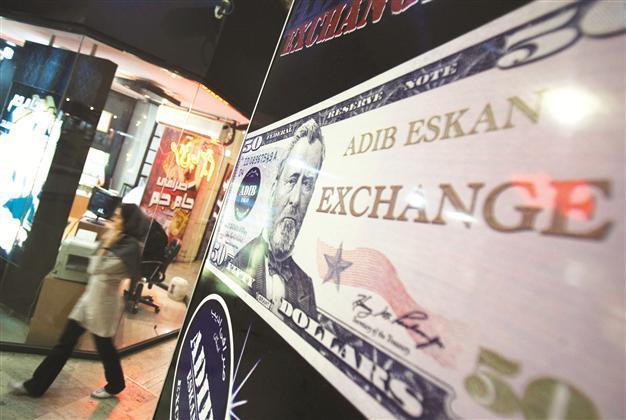EU sanctions on Iran become tougher on eve of fresh talks
BRUSSELS / TEHRAN

A woman walks past a currency exchange shop at a shopping centre in northern Tehran. President Ahmadinejad says the Western sanctions that prevent transactions of oil money is hurting Iranians. REUTERS photo
igorous new sanctions against Iran’s banking, shipping and industrial sectors took effect over the weekend, as part of the European Union’s effort to force Tehran to scale back its nuclear program.
The sanctions, agreed in October, entered EU law with their publication in the European Union’s Official Journal on Dec. 22.
The toughest EU measures yet, they include bans on financial transactions, sales to Iran of shipping equipment and steel, and imports of Iranian natural gas, adding to earlier bans, including on the OPEC producer’s oil, Reuters reported.
They reflect heightened concern over Iran’s nuclear goals and Israeli threats to attack Iranian atomic installations if diplomacy and other measures fail to deliver a solution.
Diplomats say they hope talks with Iran can resume in January, but are waiting for an answer from Tehran, which maintains its nuclear program is for purely peaceful purposes.
In a statement, Britain’s foreign office said there was a clear need “for an urgent solution.”
Pressure to increase“Iran’s leaders know that sanctions are having a significant impact,” Reuters quoted Britain’s Minister for the Middle East and North Africa Alistair Burt as saying.
“They should be in no doubt that the international community will keep up the pressure until they are ready to negotiate in good faith and take the concrete steps needed to convince the international community that they are not building a nuclear weapon.”
The new sanctions mark a significant change of policy for the 27-member bloc, which previously sought mainly to target specific people and companies with economic restrictions.
It has lagged the United States in imposing blanket industry bans because it is anxious to avoid penalizing ordinary Iranian citizens, while punishing the Tehran government.
Sanctions have increasingly inflicted severe pain on the Iranian economy, although the country has years of experience of circumventing them by using front companies and tortuous shipping routes.
The new European measures make clear natural gas shipments are prohibited in any form and swapping, as opposed to simply buying, cargoes is also outlawed.
Turkey, a non-EU member, still buys gas from the Islamic republic, with a reported gold-for gas methodology. The Turkish government, which has dramatically cut oil imports from Tehran, insists it will continue the gas trade crucial for its economy.
While imposing a general ban on financial transactions, they make exceptions for those involving humanitarian aid, food and medicine purchases and provisions for legitimate trade.
In a statement, the European Commission said the new law brought the number of entities subject to sanctions to 490 and the total number of persons to 105.
The latest companies added to the banned list include energy and steel distribution firms and financial companies.
The latest individual to be added is Babak Zanjani, owner of the Sorinet Group, based in the United Arab Emirates. He is referred to as “a key facilitator for Iranian oil deals and transferring oil-related money.
Iran is engaged in a “smart economic war” with Western powers whose sanctions are hurting citizens, President Mahmoud Ahmadinejad said on Dec. 22.
“Targeted sanctions, which the enemies say are supposed to be crippling, have led to a drop in our oil” sales, Agence France-Presse interpreted Ahmadinejad as saying in a live interview on state television, referring to an oil embargo imposed by the European Union.
Oil Money transactions affected“They do not even let us transfer the oil money,” he said. “They thought Iran’s economy would break down, but it did not.” “Iran is engaged in a smart economic war with the enemy,” he said. The EU measure, which came into effect in July, ended European purchases of Iranian crude, and has since decreased Tehran’s oil exports to its Asian customers from between 10 to 30 percent.
According to the International Energy Agency, Iranian exports in November were estimated at 1.3 million barrels per day, down from nearly 2.3 million last year.
